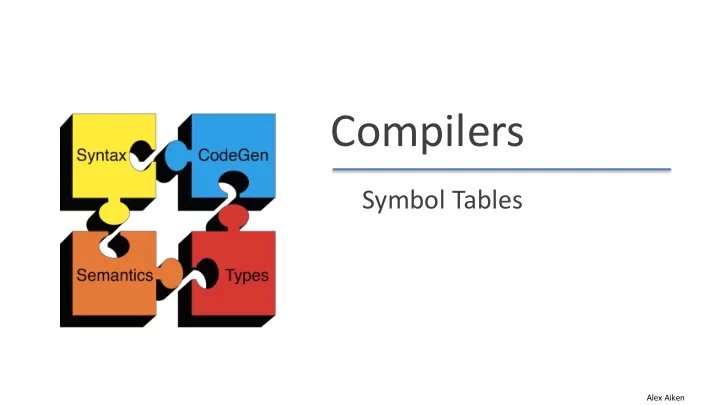

Compilers Symbol Tables Alex Aiken
Symbol Tables • Much of semantic analysis can be expressed as a recursive descent of an AST – Before : Process an AST node n – Recurse : Process the children of n – After : Finish processing the AST node n • When performing semantic analysis on a portion of the the AST, we need to know which identifiers are defined Alex Aiken
Symbol Tables • Example: the scope of let bindings is one subtree of the AST: let x: Int 0 in e • x is defined in subtree e Alex Aiken
Symbol Tables • Recall: let x: Int 0 in e • Idea: – Before processing e, add definition of x to current definitions, overriding any other definition of x – Recurse – After processing e, remove definition of x and restore old definition of x • A symbol table is a data structure that tracks the current bindings of identifiers Alex Aiken
Symbol Tables • For a simple symbol table we can use a stack • Operations – add_symbol(x) push x and associated info, such as x ’s type, on the stack – find_symbol(x) search stack, starting from top, for x. Return first x found or NULL if none found – remove_symbol() pop the stack Alex Aiken
Symbol Tables • The simple symbol table works for let – Symbols added one at a time – Declarations are perfectly nested Alex Aiken
Symbol Tables • enter_scope() start a new nested scope • find_symbol(x) finds current x (or null) • add_symbol(x) add a symbol x to the table • check_scope(x) true if x defined in current scope • exit_scope() exit current scope A symbol table manager is supplied with the project. Alex Aiken
Symbol Tables • Class names can be used before being defined • We can’t check class names – using a symbol table – or even in one pass • Solution – Pass 1: Gather all class names – Pass 2: Do the checking • Semantic analysis requires multiple passes – Probably more than two Alex Aiken
Recommend
More recommend